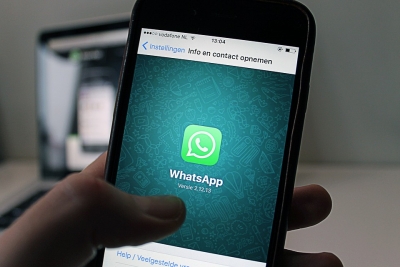WhatsApp pre-empts govt reaction that snooping a ploy against traceability
By IANS | Published: November 1, 2019 08:20 PM2019-11-01T20:20:06+5:302019-11-01T20:30:14+5:30
Facebook-owned WhatApp may have pre-empted the Indian government's reactions to the latest revelation that Indian journalists and human rights activists have been snooped by an Isreali software company that hacked the messaging platforms data.

WhatsApp pre-empts govt reaction that snooping a ploy against traceability
In the first official reaction over the brewing controversy, a WhatsApp spokesperson said the company agrees with the Indian government's strong statement about the need to safeguard the privacy of all Indian citizens.
"That is why we've taken this strong action to hold cyber attackers accountable. WhatsApp is committed to the protection of all user messages through the product we provide," the spokesperson added.
The statement came on a day when highly-placed official sources indicated a war with the messaging platform, alleging that the whole controversy may be a ploy by the messaging company to build pressure on governments to push back on their demands on traceability.
"WhatsApp officials have met Indian government in the last five months. This incident is of August.... then why did WhatsApp not inform us that time. Looking at our demand, now the US, UK and Australia have also raised pitch for traceability. So this is too much of a coincidence. This could be an attempt by WhatsApp to build pressure on countries to push back on growing global opinion for traceability using this example," a source said.
WhatsApp snooping of human rights activists and journalists in India via an Israeli spyware called Pegasus has snowballed into a major political controversy. Pegasus allegedly exploited WhatsApp's video calling system with installing the spyware via giving missed calls to snoop on 1,400 select users globally, including nearly 30-40 people in India.
"Under IT Act's Section 70 (B) they (messaging platforms) are bound to inform the Indian government about such incidences, but they informed in other countries," official sources said.
For one year, the Indian government has been asking social media and messaging platforms about to take steps about traceability of fake and malicious news. "They may be using this case (snooping) to show the data could be compromised in sharing traceability of information," a source added.
In a separate statement on the WhatsApp controversy, the Home Ministry said that the government "is committed to protect the fundamental rights of citizens, including the right of privacy and will take strict action against any intermediary responsible for breach of privacy".
On Thursday, IT Minister Ravi Shankar Prasad said that he has asked WhatsApp to explain the kind of breach and what it is doing to safeguard the privacy of millions of Indian citizens.
Government agencies have a well-established protocol for an interception from highly-ranked officials in Central and state governments for clearly stated reasons in the national interest, the Union Minister had said.
It is believed that academics, lawyers, Dalit activists and journalists in India were contacted and alerted by WhatsApp that their phones had been under state-of-the-art surveillance for a two-week period until May 2019. However, it did not say on whose behest the phones of journalists and activists across the world were targeted.
WhatsApp also said it was suing NSO Group, an Israeli surveillance firm, that is reportedly behind the technology that helped unnamed entities' spies to hack into phones of roughly 1,400 users.
The disclosure follows a lawsuit filed Tuesday in a US federal court in San Francisco in which WhatsApp alleged that the Israeli NSO Group targeted some 1,400 WhatsApp users with Pegasus.
( With inputs from IANS )
Open in app